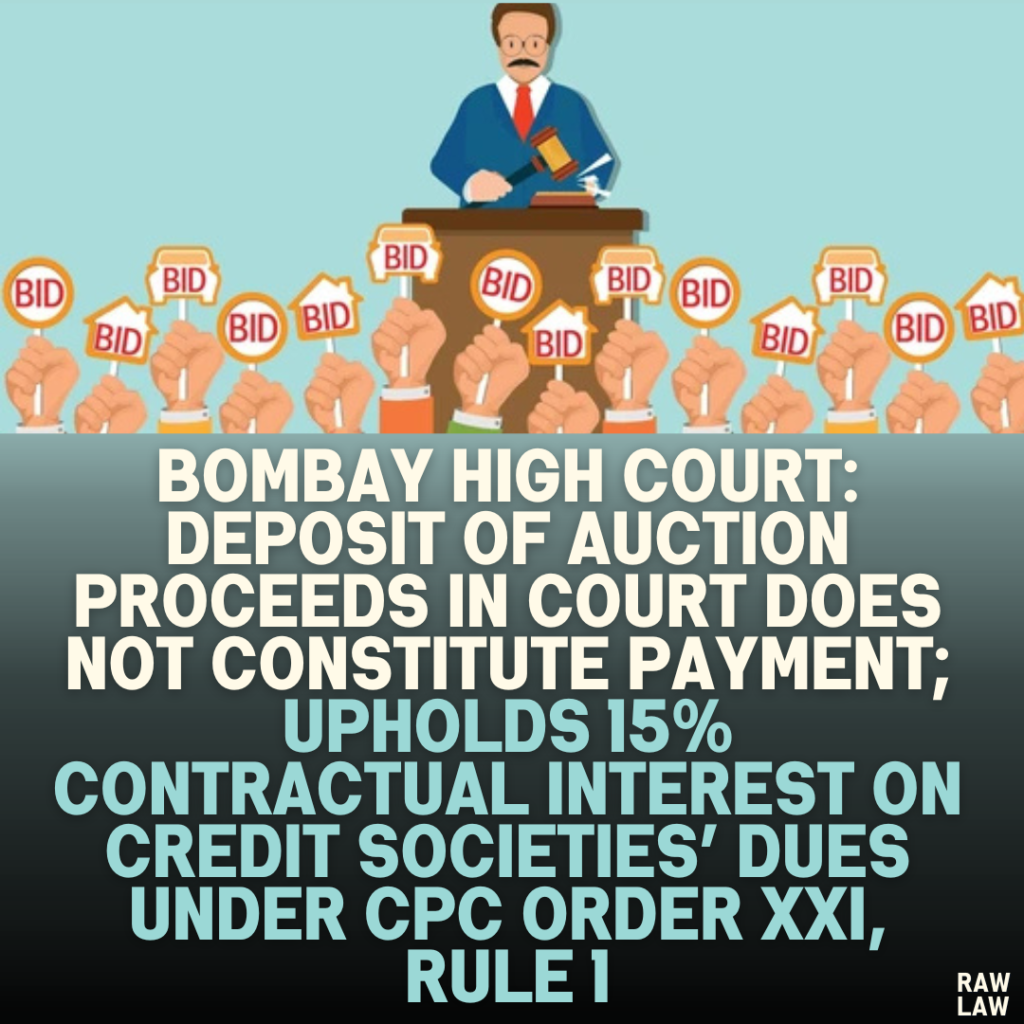Court’s Decision
The Bombay High Court dismissed three writ petitions challenging a Collector’s order dated 31st March 2023, which directed payment of dues to two credit societies (Sahyadri and Navhind) with contractual interest at 15% per annum. The court ruled that:
- Deposit of auction proceeds in court does not constitute payment under Order XXI, Rule 1 of the Code of Civil Procedure (CPC).
- The credit societies were entitled to contractual interest as their dues remained unpaid and their ability to withdraw the proceeds was obstructed due to litigation.
The court clarified that the intent behind depositing the proceeds was to secure the amount, not to extinguish the debt owed to the credit societies.
Detailed Analysis
1. Facts of the Case
- Initial Transactions: In 2010, a sugar factory leased its operations to a third party (Respondent No. 5). The lessee obtained loans from the credit societies by pledging sugar stocks.
- Sahyadri advanced ₹7 crores for 35,000 quintals of sugar.
- Navhind advanced ₹12.2 crores for 80,392 quintals of sugar.
- Default and Recovery Proceedings:
- The lessee defaulted on payments to sugarcane growers (₹36.22 crores) and other stakeholders, prompting the Commissioner of Sugar to issue a recovery certificate.
- The Collector auctioned sugar stocks, including those pledged to the credit societies, and deposited ₹27.94 crores in the court. Remaining proceeds went towards worker and grower dues.
- Legal Battle over Auction Proceeds:
- Credit societies challenged the auction and demanded their dues, including contractual interest.
- The Supreme Court, in 2016, upheld their priority over other claims, directing disbursement of the auction proceeds. However, disbursement delays continued until 2023.
2. Issues Before the Court
The primary question was:
- Does depositing the auction proceeds in court extinguish the debt owed to credit societies, thereby ceasing the accrual of interest at the contractual rate?
3. Petitioner’s Arguments
The sugar factory, supported by sugarcane growers, argued:
- Discharge of Debt: The auction proceeds deposited in court constituted payment, extinguishing their liability. Interest should cease to accrue from the date of deposit in 2011.
- Accrued Interest Only: Any interest payable should be limited to what accrued on fixed deposits held in court.
- Unjust Enrichment: Granting 15% contractual interest to the credit societies would amount to unjust enrichment.
They cited legal precedents to support that interest ceases upon deposit in court under Order XXI, Rule 1 of CPC.
4. Respondent’s Arguments
The credit societies argued:
- Unpaid Debt: The deposited funds were not freely available to them due to legal disputes, so the debt remained unpaid.
- Entitlement to Contractual Interest: They were entitled to 15% interest per the loan agreements, as the funds were held beyond their reach for over a decade.
- Litigation Delays: They blamed delays on the sugar factory and others, who resisted their claims despite the Supreme Court’s 2016 ruling in their favor.
5. Analysis of the Law
- Order XXI, Rule 1 of CPC:
- This provision governs how debts under decrees can be paid.
- Sub-rule (4) states that interest ceases once the judgment-debtor deposits the money in court and notifies the creditor.
- However, such deposits must be unconditional and intended to discharge the debt.
- Court’s Application of the Law:
- The court noted that the auction proceeds were deposited to secure the funds and not to pay off the credit societies’ dues.
- The credit societies were denied access to the funds for over a decade due to litigation.
- Therefore, the deposit did not extinguish the debt, and contractual interest continued to apply.
- Precedents Analyzed:
- In P.S.L. Ramanathan Chettiar v. Ramanathan Chettiar, the Supreme Court held that deposits made in court during litigation do not constitute payment unless the creditor is unconditionally allowed to withdraw them.
- In Delhi Development Authority v. Bhai Sardar Singh, the Supreme Court reiterated that deposits blocked due to disputes cannot be treated as payment.
6. Court’s Reasoning
- Intent of Deposit: The auction proceeds were deposited in court by order of the High Court to facilitate the auction and resolve disputes. They were not deposited as payment to discharge the credit societies’ debts.
- Litigation Delays: From 2011 to 2023, the credit societies could not access the funds due to resistance from other parties. This delay deprived them of their rightful dues.
- Equity and Justice: The court emphasized that denying contractual interest would unfairly penalize the credit societies for delays beyond their control.
7. Conclusion
The court ruled that:
- Contractual interest at 15% per annum applied from the date of default until the dues were paid in 2023.
- The deposit of auction proceeds in court was not payment under Order XXI, Rule 1 of CPC.
- The petitions challenging the Collector’s decision were dismissed.
Implications
- Clarification on Deposits and Interest: The judgment reinforces that deposits made during litigation do not automatically extinguish debts unless they are unconditional and accessible to creditors.
- Creditors’ Rights: Creditors are entitled to full contractual interest if procedural delays or disputes prevent them from accessing deposited funds.




Pingback: Bombay High Court Quashes Money Laundering Charges: Holds No Prima Facie Case of Cheating or Fraud in Real Estate Dispute Over Delay in Occupancy Certificate and Renovation Obligations - Raw Law